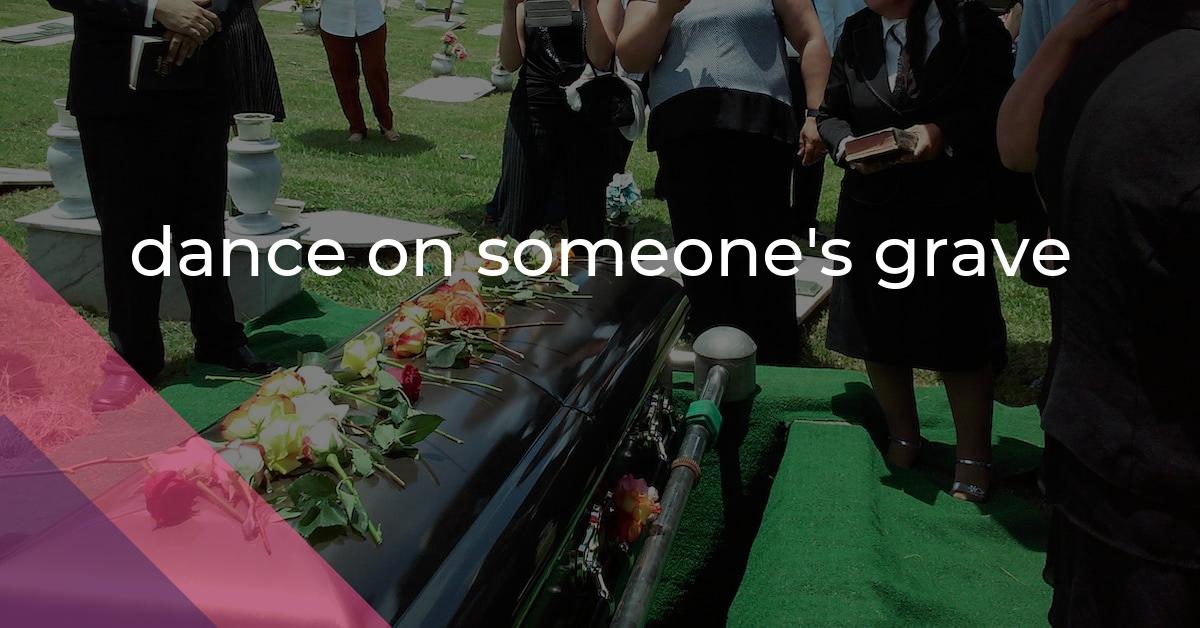dance on someone’s grave: Idiom Meaning and Origin
What does ‘dance on someone's grave’ mean?
The idiom "dance on someone's grave" means to celebrate or show joy at someone's death or misfortune.

Idiom Explorer
The idiom "turn in one's grave" means to experience strong disapproval or disappointment, symbolically imagined as the deceased person's reaction to a particular event or situation.
The idiom "fall on someone's neck" means to enthusiastically welcome or embrace someone.
The idiom "eat one's heart out" means to feel intense sadness or jealousy over someone else's success or happiness.
The idiom "eat dirt" means to suffer a humiliating defeat or to be forced to submit to someone. It is a figurative expression that implies being in a position of inferiority or having to endure a humiliating situation.
The idiom "draw one's last breath" means to die or to take one's final breath before passing away.
The idiom "down on one's luck" means having a period of misfortune or bad luck.
The idiom "dig one's own grave" means to do something that will ultimately lead to one's own downfall or ruin.
The idiom "dead and buried" means that something or someone is finished or completely gone, often in a final and irreversible way.
The idiom "dance on nothing" means to be in a precarious or dangerous situation without any support or assistance. It suggests being in a state of vulnerability or instability, where any wrong move can lead to disastrous consequences.
Joyful Farewell Steps
The idiom "dance on someone's grave" is a figurative expression used to describe someone who takes pleasure in the misfortune or death of another person. This idiom conveys a sense of satisfaction and delight in the downfall or demise of someone, often an adversary or enemy. It is important to note that this expression is not meant to be taken literally, but rather as a metaphorical representation of joy derived from the misfortunes of others.
The origin of this idiom can be traced back to ancient traditions and beliefs surrounding burial practices. Throughout history, graves have been considered sacred spaces, and dancing on someone's final resting place has been viewed as a disrespectful and offensive act. The idiom draws upon these cultural taboos and the concept of gloating over someone's death as a means of expressing extreme satisfaction or triumph.
This idiom finds its roots in the human inclination towards schadenfreude, which refers to the pleasure derived from witnessing the suffering or misfortune of others. The phrase "dance on someone's grave" encompasses this feeling of joy, suggesting that the person is so elated by the demise of their adversary that they would enthusiastically celebrate in such an inappropriate and disrespectful manner.
Throughout literature and popular culture, the usage of the idiom "dance on someone's grave" can be found. It is often employed in the context of revenge, rivalry, or personal vindication, where one relishes the downfall of their adversary to the point of engaging in a celebratory dance on their grave. This expression serves as a stark reminder of the darker sides of human nature, highlighting the pleasure derived from the suffering of others.
Although this idiom has no specific date of origin, its usage is prevalent in English-speaking societies. Its popularity can be attributed to its frequent appearance in literature, films, and various forms of media. As a result, it has become a well-established and recognizable figure of speech within the English language.
One related idiom is "dance on nothing". This expression is used to describe someone who takes pleasure in the downfall or misfortune of others, even when there is no actual grave involved. It signifies the same joy derived from the suffering of someone else, without the specific contextual reference to a burial site.
Another related idiom is "dance with the devil". This phrase is used to depict someone willingly engaging in harmful or dangerous activities for personal gain, often at the expense of others. It conveys the idea of being involved in morally questionable actions, analogous to dancing on someone's grave where one revels in the misfortune of another.
The idiom "turn in one's grave" refers to the idea that a deceased person would be distressed or disturbed by a specific event or action if they were alive. When used in relation to the idiom "dance on someone's grave", it suggests that the person being danced upon would be deeply unhappy or disturbed by the celebratory actions taking place over their final resting place.
Another related idiomatic phrase is "dig one's own grave". This expression is used to describe someone who is acting in a self-destructive manner or making decisions that will lead to their own downfall or negative consequences. It aligns with the concept of dancing on someone's grave, as both idioms convey a sense of satisfaction in witnessing the downfall or misfortune of another.
The idiom "dance attendance" is unrelated to the concept of dancing on someone's grave, but it refers to someone who is constantly following or serving someone else, often in an obsequious or servile manner. It denotes a sense of subservience or being overly deferential to another person, contrasting with the idea of celebrating over someone's misfortune.
Overall, the idiom "dance on someone's grave" encapsulates the complex emotions and darker aspects of human nature. It represents the joy derived from the misfortunes of others and the desire for revenge or vindication. This idiom serves as a reminder of the complexities of human emotions, simultaneously eliciting a sense of satisfaction and discomfort. While the act of literally dancing on someone's grave is taboo and disrespectful, the idiom allows for the expression of schadenfreude in a figurative sense, inviting contemplation on the ambivalent nature of human sentiment.
Example usage
Examples of how the idiom "dance on someone's grave" can be used in a sentence:
- 1. After defeating her biggest rival in the election, the politician felt the urge to dance on his opponent's grave.
- 2. Despite their long-standing feud, it's not right to dance on someone's grave when they pass away.
- 3. The team's victory over their bitter rivals on the football field felt so triumphant, they couldn't help but dance on their adversaries' grave.
More "Revenge" idioms



